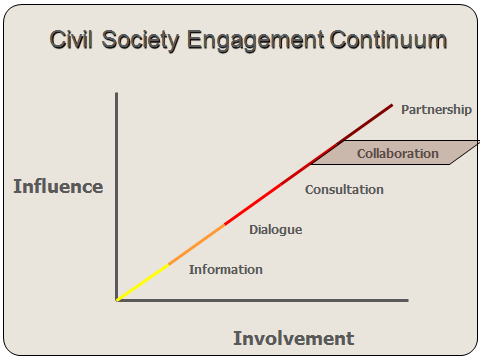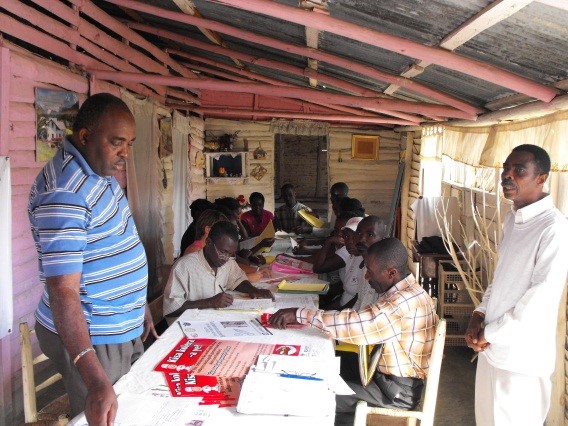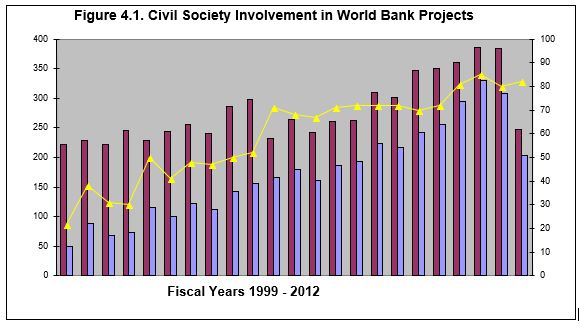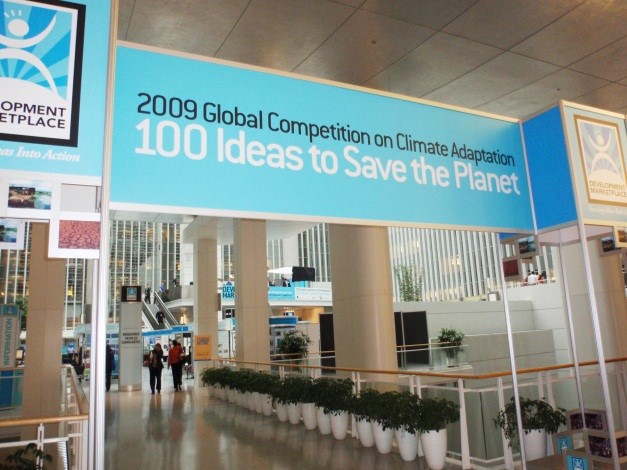 Operational collaboration between the World Bank and CSOs has grown significantly over the past two decades in such areas of health, education, and environment. Yet, because it largely occurs at the country level and within Bank-finance projects, this expanding collaboration is often not fully visible in Washington. As the latest edition of the World Bank–Civil Society Engagement Review of Fiscal Years 2010–12 demonstrates, important operational collaboration not only continued to grow over the past three years, but expanded to areas such as food security, disaster recovery, and access to information.
Operational collaboration between the World Bank and CSOs has grown significantly over the past two decades in such areas of health, education, and environment. Yet, because it largely occurs at the country level and within Bank-finance projects, this expanding collaboration is often not fully visible in Washington. As the latest edition of the World Bank–Civil Society Engagement Review of Fiscal Years 2010–12 demonstrates, important operational collaboration not only continued to grow over the past three years, but expanded to areas such as food security, disaster recovery, and access to information.
In response to the global food crisis which began in 2008, for instance, CSOs in Africa and Asia participated in the delivery of government programs in 16 countries (through seed distribution, school feeding, and agricultural production programs) financed by the Bank’s $2 billion Global Food Crisis Response Program (GFRP). CSOs were also asked to participate in the governance structure of the Global Agriculture and Food Security Program (GAFSP) which has allocated more than $400 million to projects in 12 countries.
 The Bank and CSOs also expanded their collaboration around disaster risk management and humanitarian relief as the world witnessed an increase in natural disasters. The Global Facility for Disaster Reduction and Recovery (GFDRR) launched a multipronged approach that included drafting a civil society engagement strategy, hosting policy dialogue sessions, providing training, and piloting grant funds to CSOs. There was also significant Bank-CSO collaboration on access to information and open development, characterized by joint data gathering and training initiatives. CSOs participated actively in the planning phase of the Access to Information policy launched in 2010, by providing detailed feedback on the draft staff handbook and other documents, testing the usability of the new website, and hosting joint training sessions for CSOs to better access Bank documents.
The Bank and CSOs also expanded their collaboration around disaster risk management and humanitarian relief as the world witnessed an increase in natural disasters. The Global Facility for Disaster Reduction and Recovery (GFDRR) launched a multipronged approach that included drafting a civil society engagement strategy, hosting policy dialogue sessions, providing training, and piloting grant funds to CSOs. There was also significant Bank-CSO collaboration on access to information and open development, characterized by joint data gathering and training initiatives. CSOs participated actively in the planning phase of the Access to Information policy launched in 2010, by providing detailed feedback on the draft staff handbook and other documents, testing the usability of the new website, and hosting joint training sessions for CSOs to better access Bank documents.
The clearest indication of growing WBG – CSO collaboration however, occurs within Bank-financed projects. The Civil Society Team analyzed project appraisal documents (PADs) for all 1,018 new specific investment and budget-support type development policy lending projects funded over the past three year, and found that 843 (82 percent) had some involvement of local CSOs. As the chart below indicates, civil society involvement in Bank-financed projects is a historic trend which continues to climb over the past two decades.

That involvement included: consulting CSO on project design; contracting CSOs to conduct research or provide training; including CSOs in project advisory or decision-making bodies; and funding CSO community development and social delivery efforts. Examples of CSO involvement in Bank projects included earthquake recovery efforts in Haiti, monitoring World Bank projects in Nigeria, and training on open government in Tunisia.
Increased Bank – CSO collaboration was also witnessed in terms of Bank funding of CSOs. As a matter of fact, a significant milestone was achieved with one of the largest grant making mechanisms. The Japan Social Development Fund (JSDF) reported that for the first time in its 12-year existence, it provided most of its funds directly to CSOs rather than channeling them through governments. An internal review conducted in 2011 found that 26 funding mechanisms across the Bank provided grants directly to CSOs, totaling $197 million between fiscal 2008 and 2010. These included the Civil Society Fund, Global Environment Facility, Development Marketplace, and the Extractive Industries Transparency Initiative (EITI) Trust Fund. The Bank also established the Global Partnership for Social Accountability which made its first grants in 2013 to CSOs promoting more effective and accountable government services.
 For a copy of the Civil Society Review full report and copies of the Executive Summary in six languages (Arabic, Chinese, English, French, Russian, and Spanish) please visit the civil society engagement website.
For a copy of the Civil Society Review full report and copies of the Executive Summary in six languages (Arabic, Chinese, English, French, Russian, and Spanish) please visit the civil society engagement website.
